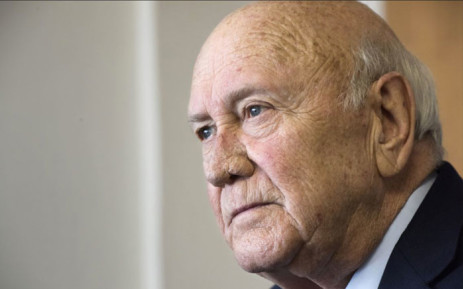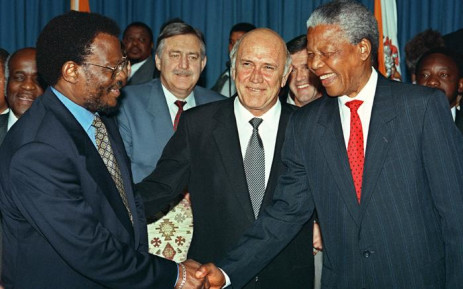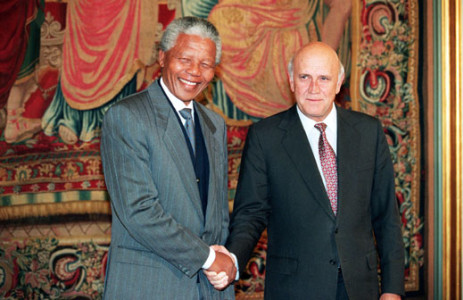APARTHEID'S LAST PRESIDENT FW DE KLERK HAS PASSED AWAY AGED 85
Frederik Willem de Klerk, South Africa’s last apartheid president, leaves a legacy that will continue to be debated, contested and defended.

CAPE TOWN – The apartheid era's last president, FW de Klerk, has passed away at the age of 85.
He passed way in the early hours of the morning at his home after a battle with cancer.
"It is with the deepest sadness that the FW de Klerk Foundation must announce that former President FW de Klerk died peacefully at his home in Fresnaye earlier this morning following his struggle against mesothelioma cancer. Mr De Klerk was 85 years old. He is survived by his wife Elita, his children Jan and Susan and his grandchildren," read a statement by the FW de Klerk Foundation.
Frederik Willem de Klerk leaves a legacy that will continue to be debated, contested and defended.
“The prohibition of the African National Congress, the Pan-Africanist Congress, the South African Communist Party and a number of subsidiary organisations is being rescinded.”
With these words, at the opening of the last apartheid Parliament on 2 February 1990, De Klerk unleashed a chain of events that would see Nelson Mandela elected president of South Africa, four years later, in a landslide victory for the ANC.
South Africa would never be the same again.
There will be those who will mourn the loss of a leader who realised the apartheid project was unsustainable and that the future of the Afrikaner people depended on a negotiated settlement.
“The country would be an entirely different place if he had not succeeded in doing what he set out to do, and achieved. It’s as simple as that,” said chairperson of the FW de Klerk Foundation Dave Steward .

FILE: Apartheid President Frederik W. De Klerk (centre) smiles while ANC leader Nelson Mandela (right) and IFP leader Mangosuthu Buthelezi shake hands after they signed an agreement at the Union Buildings in Pretoria 19 April 1994. Pik Botha, South African Foreign Affairs Minister (C, 2nd row) looks on. Picture: AFP.
There will also be those who see him as someone who sold out white Afrikaners – a traitor of the volk (people).
“There were always going to be Afrikaners who would never forgive him for surrendering sovereign Afrikaner power, giving up the Afrikaners’ right to national self-determination,” said Steward.
And then there are those who will celebrate the passing of a man who held the reins of power during one of the bloodiest periods in the country’s history, who failed to take any personal responsibility for atrocities committed by the government’s security forces. A man who, up until shortly before his death, did not see apartheid as a crime against humanity.
University of Pretoria political scientist Sithembile Mbete believes history will not treat De Klerk well, in spite of the steps he took.
“I think that [it was] his inability to be completely forthcoming about the crimes of apartheid that were committed - both while he was president but also in the many years he was in Cabinet – and also his failure to acknowledge apartheid as a crime against humanity and to really acknowledge just how much damage apartheid did.”
AFRIKANER NATIONALISM
De Klerk was born in Johannesburg on 13 March 1936 into a politically active, well-connected family that flew the Afrikaner nationalist banner high. With a law degree from Potchefstroom University, De Klerk set up a practice in Vereeniging and then won a seat as a member of Parliament, after which he rose through the ranks of the National Party.
He took over as party leader after PW Botha was incapacitated by a stroke and became president of the country in 1989, meeting Mandela for the first time that December.
Together with Nelson Mandela, De Klerk was awarded the Nobel Peace Prize in 1993.
There was little chemistry between the two men and there were some serious flare-ups when De Klerk served in Mandela’s Cabinet as deputy president, alongside Thabo Mbeki.

FILE: Nelson Mandela, African National Congress (ANC) President (left) and South Africa's last apartheid President FW de Klerk (right), shake hands on 10 December 1993 in Oslo after being awarded the Nobel Peace Prizes. Picture: AFP
De Klerk would later lead the National Party out of the government of national unity, to become the official opposition. In 1997 he quit politics.
“De Klerk had achieved his basic objectives – so it was a very strange situation that the culmination of his career came with his loss of office,” said Steward.
Mbete said, “I think that if he’d had the courage and the morality and the ethics to really embrace this new South Africa that he was so instrumental in creating I think we would be far further than we are in our nation-building project.”
De Klerk is survived by his wife, Elita, whom he married after he and his first wife, Marike, divorced. Marike was later murdered in her home. De Klerk had three children: Willem, Jan and Susan. Willem died last year from cancer.
https://ewn.co.za/2021/11/11/apartheid-s-last-president-fw-de-klerk-has-passed-away-aged-85

No comments:
Post a Comment